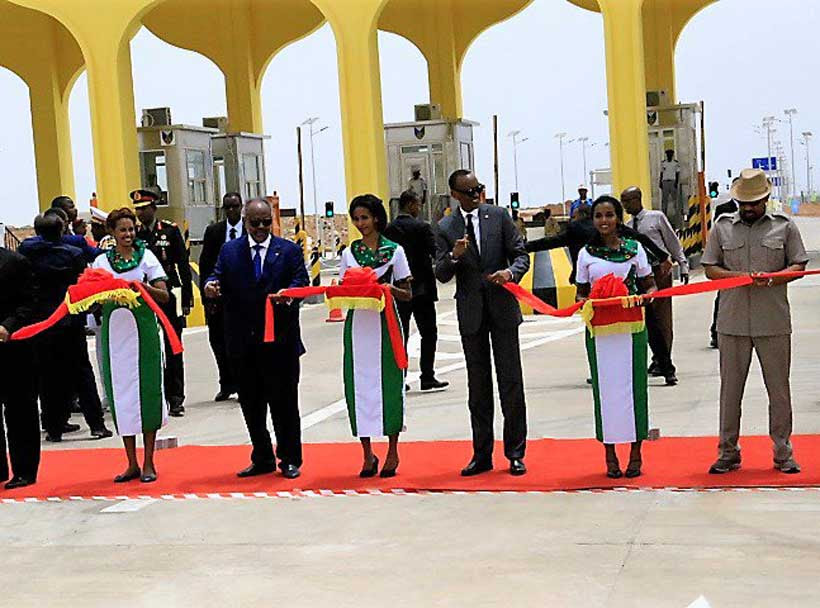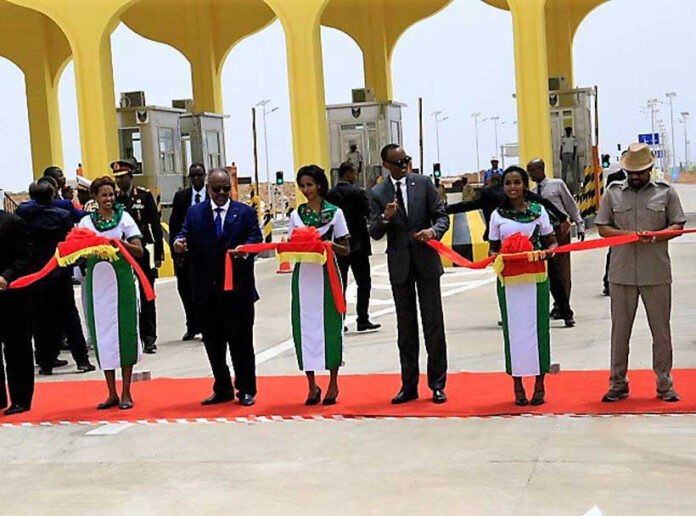
By Samantha Maloof
For
the past quarter century, Djibouti has flourished as the Horn of
Africa’s most strategic port, serving as a lifeline for landlocked
Ethiopia’s $3.13 billion in exports at the mouth of the Red Sea and Gulf
of Aden. So on the face of it, the Phase 1 opening last month of the
Chinese funded, multi-billion dollar Djibouti International Free Trade
Zone (DIFTZ) appears to position the tiny nation as a growing trading
hub for the entire East African region. But is that just wishful
thinking?
the past quarter century, Djibouti has flourished as the Horn of
Africa’s most strategic port, serving as a lifeline for landlocked
Ethiopia’s $3.13 billion in exports at the mouth of the Red Sea and Gulf
of Aden. So on the face of it, the Phase 1 opening last month of the
Chinese funded, multi-billion dollar Djibouti International Free Trade
Zone (DIFTZ) appears to position the tiny nation as a growing trading
hub for the entire East African region. But is that just wishful
thinking?
The
DIFTZ is a sprawling complex meant to house four industrial clusters
specializing in trade and logistics, export processing, business and
financial support services, as well as manufacturing and duty-free
merchandise retail. It’s touted to provide employment for tens of
thousands and solidify Djibouti’s reputation as a business-friendly
place.
DIFTZ is a sprawling complex meant to house four industrial clusters
specializing in trade and logistics, export processing, business and
financial support services, as well as manufacturing and duty-free
merchandise retail. It’s touted to provide employment for tens of
thousands and solidify Djibouti’s reputation as a business-friendly
place.
The
geopolitical calculations behind China’s generous financing in Djibouti
are part of its Belt and Road Initiative, an aggressive economic plan
designed to open up and create new markets for Chinese goods and
technology by strengthening the traditional Silk Road trade route. That
rationale is rooted in the fact that Ethiopia uses ports in Djibouti for
about 95 percent of its external trade and pays around $1.5-2 billion in
port fees. With the Ethiopian economy growing fast, obtaining better
access to Addis Ababa is a crucial objective for the Chinese leadership.
geopolitical calculations behind China’s generous financing in Djibouti
are part of its Belt and Road Initiative, an aggressive economic plan
designed to open up and create new markets for Chinese goods and
technology by strengthening the traditional Silk Road trade route. That
rationale is rooted in the fact that Ethiopia uses ports in Djibouti for
about 95 percent of its external trade and pays around $1.5-2 billion in
port fees. With the Ethiopian economy growing fast, obtaining better
access to Addis Ababa is a crucial objective for the Chinese leadership.
But
Djibouti should hold the champagne for now. Despite the glowing press
releases, there are at least three major partners who have serious
reasons for doubting the trustworthiness of the country’s leaders and
its viability as a new axis for regional trade.
Djibouti should hold the champagne for now. Despite the glowing press
releases, there are at least three major partners who have serious
reasons for doubting the trustworthiness of the country’s leaders and
its viability as a new axis for regional trade.
First, many U.S. analysts are expressing concern that
the DIFTZ is financed by loans from state-backed financial institutions
from China, dulling Djibouti’s triumphant expansion as a critical line
between the export-rich Ethiopia and vital shipping lanes. In East
Africa, the Export-Import Bank of China is the major investor in
at least eight infrastructure projects, including an ongoing $322
million water pipeline project from Ethiopia and the $490 million Addis
Ababa-Djibouti railway. Yet critics have described the Belt and Road Initiative as a method of entrapping poor countries to Beijing as “economic vassals.” For instance, a major report from
the Washington-based Center for Global Development released in March
cautions that the Chinese iniatives raise “serious concerns about
sovereign debt sustainability in eight countries it funds,” including
Djibouti.
the DIFTZ is financed by loans from state-backed financial institutions
from China, dulling Djibouti’s triumphant expansion as a critical line
between the export-rich Ethiopia and vital shipping lanes. In East
Africa, the Export-Import Bank of China is the major investor in
at least eight infrastructure projects, including an ongoing $322
million water pipeline project from Ethiopia and the $490 million Addis
Ababa-Djibouti railway. Yet critics have described the Belt and Road Initiative as a method of entrapping poor countries to Beijing as “economic vassals.” For instance, a major report from
the Washington-based Center for Global Development released in March
cautions that the Chinese iniatives raise “serious concerns about
sovereign debt sustainability in eight countries it funds,” including
Djibouti.
Even
more worrisome, Chinese commercial investment in Djibouti has been
paralleled by the construction of a major Chinese military base, a mere
six miles from the United States’ long-established Camp Lemonnier — the
only permanent U.S. military base in Africa. The Chinese base is the
first outside its borders and gives Beijing a military foothold on the
African continent, an outcome that previously led to American political
and military leaderspressuring the Djibouti government to block the construction of the base. U.S. military experts have expressed concern that a Chinese presence would hinder U.S. interests and its counter-terrorism missions, tensions that remain as American allies France, Japan and Italy also have bases of various sizes and capabilities in Djibouti.
more worrisome, Chinese commercial investment in Djibouti has been
paralleled by the construction of a major Chinese military base, a mere
six miles from the United States’ long-established Camp Lemonnier — the
only permanent U.S. military base in Africa. The Chinese base is the
first outside its borders and gives Beijing a military foothold on the
African continent, an outcome that previously led to American political
and military leaderspressuring the Djibouti government to block the construction of the base. U.S. military experts have expressed concern that a Chinese presence would hinder U.S. interests and its counter-terrorism missions, tensions that remain as American allies France, Japan and Italy also have bases of various sizes and capabilities in Djibouti.
The
second reason: Ethiopia. Until a few months ago, Djibouti represented
the country’s only way to access the sea and, as a stable partner,
reaped the benefits of a near-monopoly on thriving Ethiopian trade.
While ports exist in Sudan, Somaliland, and Eritrea, Djibouti’s
developed facilities, political stability and investment-friendly
atmosphere have proven more attractive than anywhere else in the region.
second reason: Ethiopia. Until a few months ago, Djibouti represented
the country’s only way to access the sea and, as a stable partner,
reaped the benefits of a near-monopoly on thriving Ethiopian trade.
While ports exist in Sudan, Somaliland, and Eritrea, Djibouti’s
developed facilities, political stability and investment-friendly
atmosphere have proven more attractive than anywhere else in the region.
Now, however, a new player is coming to town: according to reports from Bloomberg,
Eritrea is now mulling building a port on its coastline to export
potash from its own mines as well as from Ethiopia. The port will be
based at the Bay of Anfile, close to Eritrea’s potash mine at Colluli,
which contains large quantities of potash that can be used as
fertilizers for fruits, vegetables, and coffee trees. Most
significantly, the development follows a historic rapprochement between
Ethiopia and its former province of Eritrea in July, which has left
Djibouti scrambling to protect its market share.
Eritrea is now mulling building a port on its coastline to export
potash from its own mines as well as from Ethiopia. The port will be
based at the Bay of Anfile, close to Eritrea’s potash mine at Colluli,
which contains large quantities of potash that can be used as
fertilizers for fruits, vegetables, and coffee trees. Most
significantly, the development follows a historic rapprochement between
Ethiopia and its former province of Eritrea in July, which has left
Djibouti scrambling to protect its market share.
The third issue: the United Arab Emirates (UAE). Djibouti illegally seized a
leased port container terminal from the UAE-based DP World company over
a dispute dating back to at least 2012. Earlier this month, Dubai
successfully sued the Djibouti government in a London-based
international arbitration court over the seizure. Eyebrows were raised
when Djibouti issued a statement dismissing the ruling as
inconsequential, and the country is now trying to negotiate damages. But
the scandal has already cast a shadow over Djibouti with potential foreign investors, as large shipping clients such as DP World publicly advocate for an additional 10 to 12 ports from Sudan to Somalia and continue to make a number of investments in East Africa, including in Somaliland.
leased port container terminal from the UAE-based DP World company over
a dispute dating back to at least 2012. Earlier this month, Dubai
successfully sued the Djibouti government in a London-based
international arbitration court over the seizure. Eyebrows were raised
when Djibouti issued a statement dismissing the ruling as
inconsequential, and the country is now trying to negotiate damages. But
the scandal has already cast a shadow over Djibouti with potential foreign investors, as large shipping clients such as DP World publicly advocate for an additional 10 to 12 ports from Sudan to Somalia and continue to make a number of investments in East Africa, including in Somaliland.
The
Emiratis also have close ties to Eritrea, where they established a
naval base in 2015 that has been used to support the Saudi-led war
against Houthi rebels in Yemen. And it was the UAE that helped broker a
peace deal between Eritrea and Ethiopia, a further indicator that UAE
businesses may favor Eritrean ports over those in Djibouti.
Emiratis also have close ties to Eritrea, where they established a
naval base in 2015 that has been used to support the Saudi-led war
against Houthi rebels in Yemen. And it was the UAE that helped broker a
peace deal between Eritrea and Ethiopia, a further indicator that UAE
businesses may favor Eritrean ports over those in Djibouti.
Is
Chinese investment in the DIFTZ and other infrastructure projects
enough to make up for all of this disruption? Perhaps not. Beijing had
already started to cool on Ethiopia as an investment destination, and if
the Ethiopian market finds multiple alternative ports in Eritrea or
Somaliland, the promises of a thriving DIFTZ may end up being little
more than hype.
Chinese investment in the DIFTZ and other infrastructure projects
enough to make up for all of this disruption? Perhaps not. Beijing had
already started to cool on Ethiopia as an investment destination, and if
the Ethiopian market finds multiple alternative ports in Eritrea or
Somaliland, the promises of a thriving DIFTZ may end up being little
more than hype.




